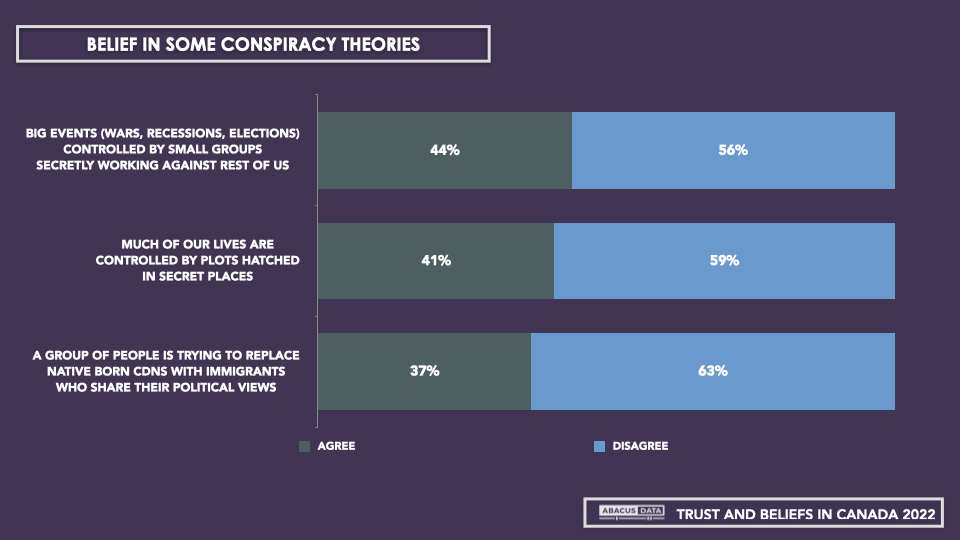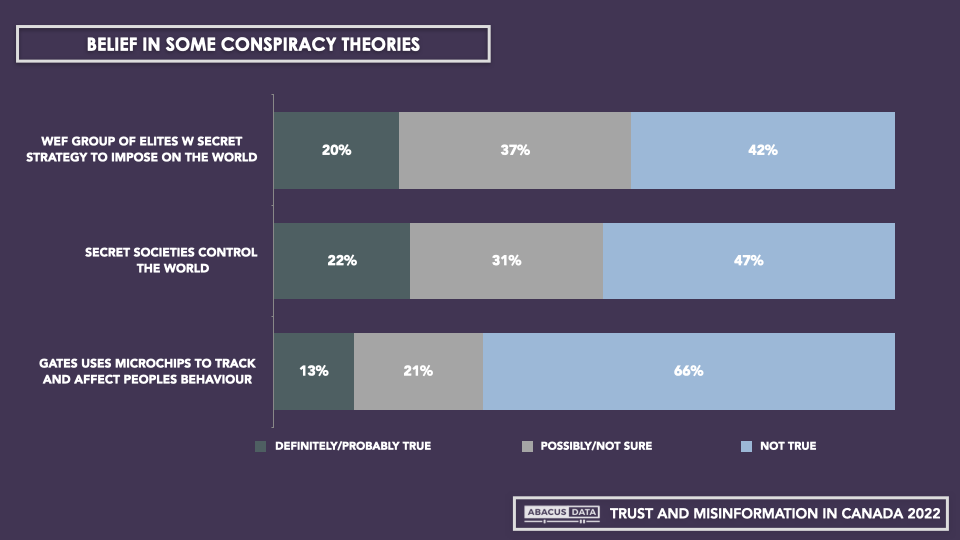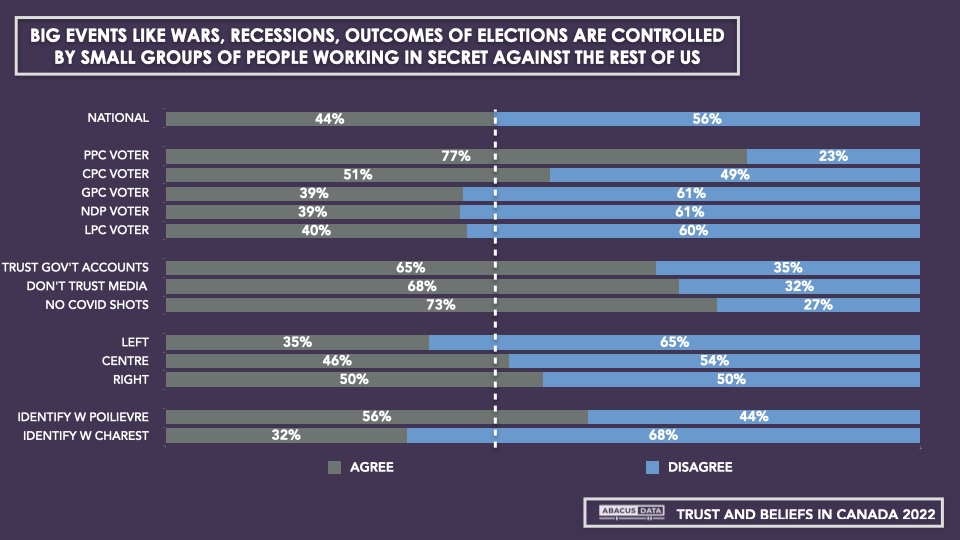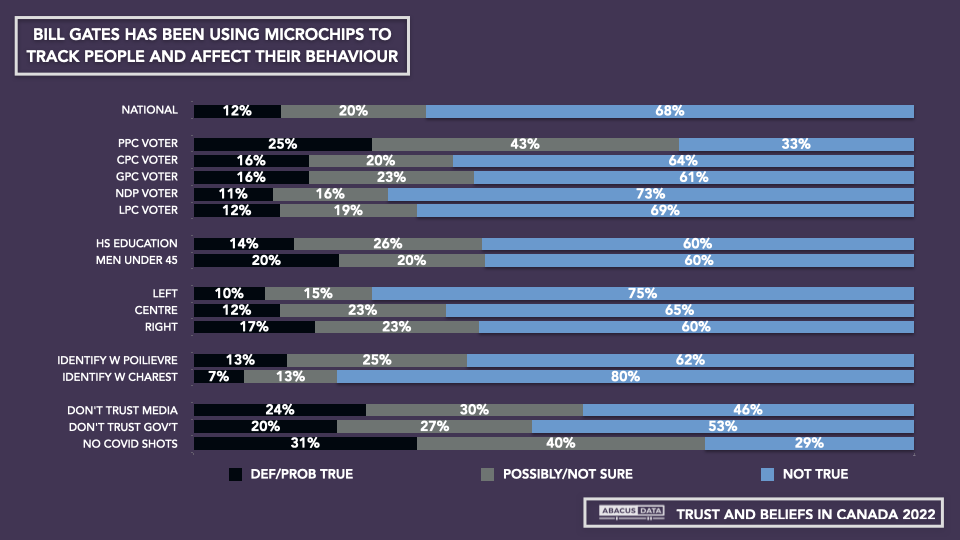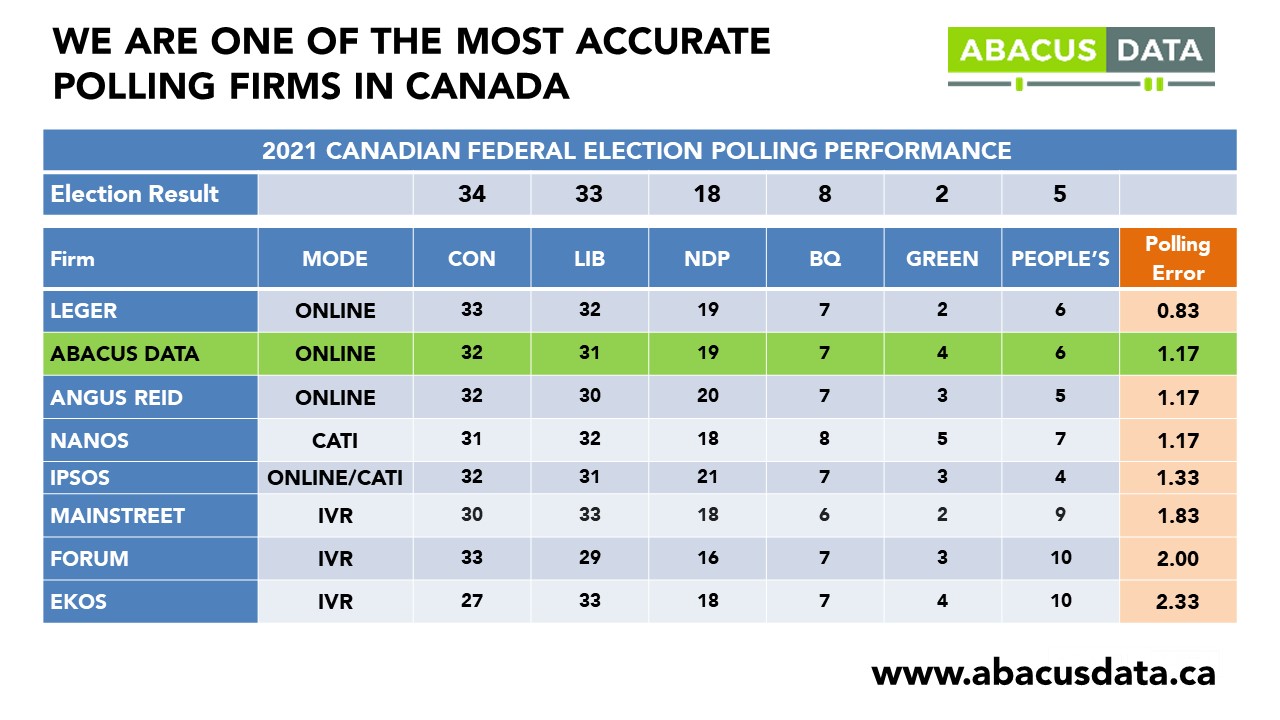Millions believe in conspiracy theories in Canada
June 12, 2022
We recently completed nationwide surveying among 1500 Canadians. The focus was on the levels of trust people have in institutional sources of information, and belief in conspiracy theories. This is the second in a series called “Trust & Facts: What Canadians Believe”
• 44% (the equivalent of 13 million adults) believe “big events like wars, recessions and the outcomes of elections are controlled by small groups of people working in secret against us”. Almost as many agree “much of our lives are being controlled by plots hatched in secret places
• 37% (or 11 million) think “there is a group of people in this country who are trying to replace native born Canadians with immigrants who agree with their political views. This is an articulation of what is commonly referred to as replacement theory.
• 20% believe it is definitely or probably true that “the World Economic Forum is a group of global elites with a secretive strategy to impose their ideas on the world.” Another 37% think it is possibly true or aren’t sure either way.
• 13% think it is definitely or probably true that Microsoft founder Bill Gates is using microchips to track people and affect human behaviour. Another 21% say it’s possible, or aren’t really sure.
A deeper dive into demographic and other variables that correlate with these beliefs revealed:
• Belief in these theories is higher among supporters of the People’s Party, those who self-identify on the right of the spectrum, those who have not received any COVID-19 shots, and those who think media and official government accounts of events can’t be trusted. Those who feel Pierre Poilievre is the Conservative leadership candidate closest to their values and ideas are more likely to believe these theories when compared to those who feel more aligned with Jean Charest.
THE UPSHOT
Canadians who want to believe that Canadian society is relatively unaffected by conspiracy thinking will find little comfort in these results. Millions believe that our lives are controlled by secret plots to undermine our interests.
That such beliefs correlate strongly with the instinct to mistrust what media report and what governments say –is a challenge that threatens all institutions that depend on an informed body politic and is like a poison affecting our civil discourse. Only recently we’ve witnessed how a massive demand for the protection offered by Covid 19 vaccines fostered a strenuous effort by those who disbelieve government and media to deny the value of those same vaccines.
This question of whether people can and should trust in institutional voices and known facts is the central theme running through the current leadership dynamic within the Conservative Party leadership race. The data make it clear that to compete for votes from the People’s Party base, Conservatives could choose to embrace conspiracy thinking, but in so doing would alienate a good portion of others, and create hesitancy among half their current voter coalition.
Perhaps the most disconcerting thing in these numbers is the fact that mistrust of institutional accounts isn’t simply neutral skepticism – it is often accompanied by a willingness to believe dangerous contrarian theories. This threatens to undermine the ability of political parties, businesses, civil society groups, and governments to help build consensus and make progress together.
METHODOLOGY
The survey was conducted with 1500 Canadian adults from May 20 to 24, 2022. A random sample of panelists were invited to complete the survey from a set of partner panels based on the Lucid exchange platform. These partners are typically double opt-in survey panels, blended to manage out potential skews in the data from a single source.
The margin of error for a comparable probability-based random sample of the same size is +/- 2.53%, 19 times out of 20.
The data were weighted according to census data to ensure that the sample matched Canada’s population according to age, gender, educational attainment, and region. Totals may not add up to 100 due to rounding.
This survey was paid for by Abacus Data Inc.
Abacus Data follows the CRIC Public Opinion Research Standards and Disclosure Requirements that can be found here: https://canadianresearchinsightscouncil.ca/standards/
ABOUT ABACUS DATA
We are the only research and strategy firm that helps organizations respond to the disruptive risks and opportunities in a world where demographics and technology are changing more quickly than ever.
We are an innovative, fast-growing public opinion and marketing research consultancy. We use the latest technology, sound science, and deep experience to generate top-flight research-based advice to our clients. We offer global research capacity with a strong focus on customer service, attention to detail, and exceptional value.
We were one of the most accurate pollsters conducting research during the 2021 Canadian election following up on our outstanding record in 2019.
Contact us with any questions.
Find out more about how we can help your organization by downloading our corporate profile and service offering.

